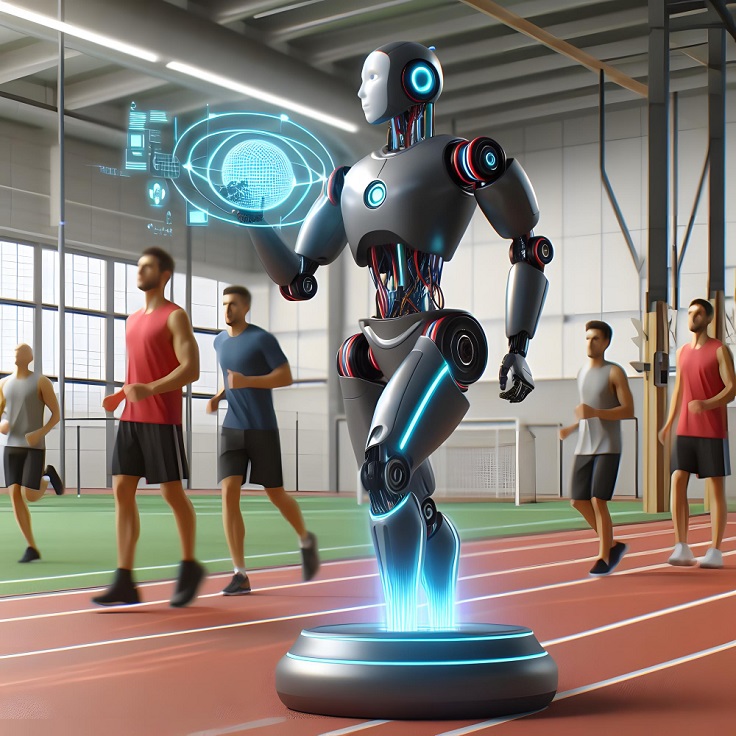AI in Sports: Revolutionizing Performance, Fans, and Business
From Locker Rooms to Living Rooms: How AI Is Changing the Game
Artificial Intelligence (AI) is no longer just a buzzword confined to Silicon Valley. From healthcare to finance, its influence is undeniable — and the sports industry has now become one of the most exciting arenas for AI-driven transformation. The integration of machine learning, computer vision, and predictive analytics is reshaping how athletes train, how organizations operate, and how fans experience the game.
What was once limited to elite clubs with deep budgets is now becoming mainstream, giving even smaller teams access to tools that were previously unimaginable. Just as AI is transforming global industries, it is rapidly rewriting the rulebook for sports.
Smarter Performance on the Field
For athletes and coaches, AI provides a competitive edge that goes far beyond traditional statistics. Modern systems analyze everything from body mechanics to in-game decisions, helping to fine-tune performance.
Real-time analytics: Platforms powered by AI can instantly assess player movement, fatigue levels, and positional data. Coaches gain immediate feedback, enabling them to adjust strategies mid-match.
Injury prevention: By studying historical performance data and biometric signals, AI can identify early warning signs of fatigue or stress that often precede injuries. This proactive approach is invaluable in extending athletes’ careers.
Personalized training: Emerging platforms track players from youth academies to the professional level, tailoring workouts based on strengths, weaknesses, and long-term goals.
Leagues across the world are already experimenting. The NBA uses tracking systems that monitor every pass and shot, while clubs in European football are investing in AI tools to optimize both tactical play and scouting decisions.
Fans at the Center of the Experience
If athletes are the heartbeat of sports, fans are the lifeblood. AI is now revolutionizing how audiences connect with their favorite teams.
Hyper-personalized engagement: By analyzing ticketing data, online behavior, and social media interactions, teams can deliver experiences tailored to individual fans. A first-time attendee might get recommendations for family-friendly activities, while a lifelong supporter could receive exclusive behind-the-scenes access.
Immersive content: AI is powering augmented reality (AR) and virtual reality (VR) experiences, allowing fans to watch games from unique angles or relive iconic moments in entirely new formats.
Sentiment analysis: Teams can now process thousands of fan comments in real time, adjusting communication strategies to match the mood of the crowd.
Closer to home, the New York Red Bulls have become a model for AI adoption in fan engagement. From refining marketing campaigns to experimenting with AI-powered training for their sales staff, they are setting a blueprint for how clubs can listen to and connect with their communities.
Behind the Scenes: Smarter Business Operations
Beyond the pitch and the stands, AI is transforming how sports organizations run their day-to-day operations.
Ticketing & sales automation: Algorithms can predict which leads are most likely to convert, helping sales teams focus on high-value opportunities.
Customer service efficiency: Chatbots and virtual assistants now handle routine queries, freeing staff to work on relationship-building and strategy.
Revenue optimization: By analyzing historical sales and fan behavior, AI can recommend pricing strategies that maximize both attendance and profitability.
The shift is less about replacing humans and more about amplifying their potential. A salesperson armed with AI insights can have more meaningful conversations, while a marketing team can test dozens of campaigns in hours rather than weeks.
Balancing Innovation with Responsibility
Like any technology, AI brings challenges. Data privacy, ethical use, and dependency on external providers remain pressing issues. Fans appreciate personalized experiences, but there is a fine line between helpful recommendations and intrusive monitoring.
Sports organizations need to adopt responsible AI practices - establishing transparent policies for data collection, protecting sensitive player and fan information, and ensuring AI complements human judgment rather than replacing it.
Those who strike the right balance will not only gain a competitive edge but also build long-term trust with their communities.
The Entrepreneurial Era Perspective
For business leaders - whether in sports, tech, or beyond - the message is clear: AI is not just another digital tool. It is a strategic enabler that can unlock new opportunities for growth, deepen customer relationships, and create entirely new business models.
The sports industry is a living example. From uncovering hidden talent to transforming fan experiences and streamlining operations, AI is setting the stage for the next generation of success stories. Clubs like the New York Red Bulls illustrate that early adopters will define the future - not just in terms of competition on the field, but in building sustainable businesses off it.
Final Word
Artificial intelligence in sports is more than a trend - it’s a revolution in motion. The winners of tomorrow will be those who embrace innovation while safeguarding the human elements that make sports so powerful: fairness, trust, and community.
For entrepreneurs, the lesson is simple: look at what AI is doing in sports today, and imagine what it could do for your industry tomorrow. The playbook is being rewritten - and those ready to act will lead the game.


